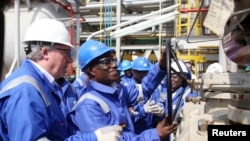ACCRA —
A new law in Ghana requires oil and gas companies to make greater use of local products and services.
The broad objective of the new law, known as Petroleum Regulation on Local Content and Participation, is to create jobs and promote business development.
It gives preference to local groups in the granting of licenses for petroleum activities. The law further gives Ghanaians the opportunity to own up to a five percent stake in any investment by an international company.
Ghana discovered offshore oil deposits in 2007, and commercial production began in 2010.
The country's Petroleum Commission is convinced the new law will help more oil revenue reach the people.
The chief executive officer of the commission, Theo Ahwireng, said local participation in the oil sector will be a big boost to Ghana's economy.
“It is through participation that you develop the skills of the people, so that at the end of the day when the oil wealth is gone, you will leave an economy with skilled people and skilled business," he said. "We’ve had fantastic response from a great number of the companies. We have sat with them to help them go through the procurement process and I must say the support has been very good."
However, it remains unknown whether the law will create more jobs in offshore oil exploration and drilling. Local companies active in the oil sector mostly offer onshore services such as engineering, construction, security and transport.
Some of the local companies are small and poorly structured. If they try to compete for lucrative offshore contracts, they stand to face stiff competition from more experienced firms from abroad.
Awhireng hopes a proposed enterprise development center, set up in partnership with international oil companies, would help local workers and businesses gain the skills that oil companies need.
“Nobody wakes up from the beginning and becomes a dynamic gold medallist," he said. "You need to go through a development process. I know that most of the rig workers that we have at the moment are a legacy of the work during the 80’s between Ghana and Cote D’Ivoire. Definitely, these gentlemen are advanced in age and there is need for us to get younger people. Currently, the Petroleum Commission is embarking on an exhaustive human resource mapping to look at the skills that are applicable; those that we have in Ghana and those that we don’t have and find out exactly what we need to do to develop these competencies locally."
The executive director of Ghana’s Oil and Gas Service Providers Association, Nuertey Adzeman, describes the new law as the best thing ever to happen in the country’s oil industry. He said its provisions can lead to "winning situations" for both international investors and local companies hoping to profit from Ghana's growing oil sector.
The broad objective of the new law, known as Petroleum Regulation on Local Content and Participation, is to create jobs and promote business development.
It gives preference to local groups in the granting of licenses for petroleum activities. The law further gives Ghanaians the opportunity to own up to a five percent stake in any investment by an international company.
Ghana discovered offshore oil deposits in 2007, and commercial production began in 2010.
The country's Petroleum Commission is convinced the new law will help more oil revenue reach the people.
The chief executive officer of the commission, Theo Ahwireng, said local participation in the oil sector will be a big boost to Ghana's economy.
“It is through participation that you develop the skills of the people, so that at the end of the day when the oil wealth is gone, you will leave an economy with skilled people and skilled business," he said. "We’ve had fantastic response from a great number of the companies. We have sat with them to help them go through the procurement process and I must say the support has been very good."
However, it remains unknown whether the law will create more jobs in offshore oil exploration and drilling. Local companies active in the oil sector mostly offer onshore services such as engineering, construction, security and transport.
Some of the local companies are small and poorly structured. If they try to compete for lucrative offshore contracts, they stand to face stiff competition from more experienced firms from abroad.
Awhireng hopes a proposed enterprise development center, set up in partnership with international oil companies, would help local workers and businesses gain the skills that oil companies need.
“Nobody wakes up from the beginning and becomes a dynamic gold medallist," he said. "You need to go through a development process. I know that most of the rig workers that we have at the moment are a legacy of the work during the 80’s between Ghana and Cote D’Ivoire. Definitely, these gentlemen are advanced in age and there is need for us to get younger people. Currently, the Petroleum Commission is embarking on an exhaustive human resource mapping to look at the skills that are applicable; those that we have in Ghana and those that we don’t have and find out exactly what we need to do to develop these competencies locally."
The executive director of Ghana’s Oil and Gas Service Providers Association, Nuertey Adzeman, describes the new law as the best thing ever to happen in the country’s oil industry. He said its provisions can lead to "winning situations" for both international investors and local companies hoping to profit from Ghana's growing oil sector.




